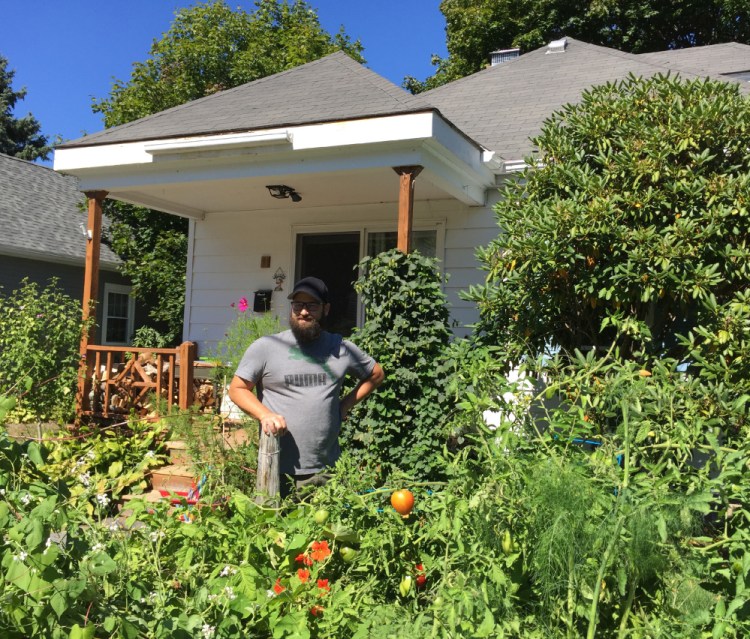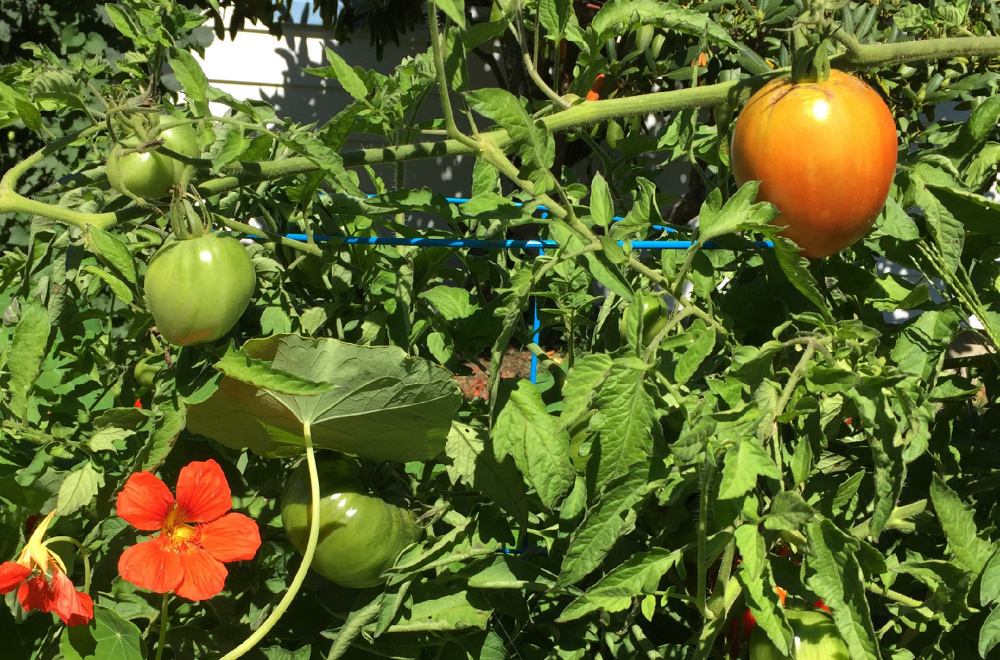SOUTH PORTLAND — City officials launched a pesticide education and outreach effort on Tuesday, hoping that it will encourage residents to comply with a newly adopted ban when it takes effect in 2018.
People like John Hychko won’t need convincing. Hychko and his wife, Shannon, converted their front lawn into a pesticide-free garden when they bought their Barstow Street bungalow eight years ago. A puree of sweet English peas, grown in a raised bed laced with organic compost, was the first solid food that they fed their son Logan.
They like that Logan, who is now 6, can pluck a ripe cherry tomato from the vine and pop it into his mouth without washing it. And they’re unfazed by a few insect holes in the curly kale and rainbow chard that grow among bright orange nasturtiums, feathery green fennel and vibrant pink cosmos.
“A small percentage is going to the critters,” Hychko, 35, said Tuesday. “But that’s OK. We just mix in some good compost and let the plants do their thing. I definitely never want to have chemicals in our yard.”
Mayor Tom Blake and Sustainability Coordinator Julie Rosenbach announced plans to appoint a Pest Management Advisory Committee as soon as possible and begin developing an outreach and education plan for the pesticide ordinance that the City Council adopted last week.
They acknowledge that it may be an uphill battle to win over some residents who refer to Rosenbach as the “sustainability czar” and question both the need for and the enforceability of an ordinance that carries no penalties.
“It does have an enforcement mechanism,” Rosenbach countered on Tuesday. “It doesn’t have fines, but we’re going to work with people to bring them into compliance. Education will be a huge part of that. A complaint can be filed and in general, people don’t want that. We’re assuming most law-abiding citizens are going to want to comply.”
Under the ordinance, only pesticides classified as organic or “minimum risk” by federal agencies will be allowed for use on city-owned and private property. Retailers in the city can still sell banned products, including glyphosate-based Roundup, neonicotinoids and certain weed-and-feed applications. And residents could still buy them.
The ban exempts commercial agriculture and playing surfaces at golf courses, and it will allow waivers for public health, safety and environmental threats, such as mosquitoes, poison ivy and invasive tree insects.
To help win public support, the city plans to send out informational fliers, hold public workshops and gardening demonstrations, and develop active partnerships with the Friends of Casco Bay, Cumberland County Soil & Water Conservation District and the Maine Organic Farmers and Growers Association. They also plan to work with local garden centers to make sure they can advise and meet the needs of customers using organic lawn and garden practices.
“Hopefully, we’ll get 95 to 100 percent compliance and we won’t need penalties,” Blake said. But if residents don’t readily comply, some councilors have suggested that fines could be added in the future. When first proposed, the ban called for escalating fines of $200, $500 and $1,000 per offense following an initial warning.
As residents prepare to meet the ban over the next year or so, the city will take the lead in becoming an example to others. The ban will apply to city property starting May 1, 2017, and broaden to private property May 1, 2018. The ordinance will apply to the South Portland Municipal Golf Course and the privately owned Sable Oaks Golf Club starting May 1, 2019.
Outreach and enforcement of the ordinance will be overseen by the seven-member Pest Management Advisory Committee, which will consist of the city’s stormwater program coordinator, a practicing expert in plant and soil science, two licensed landscape professionals and three residents. Anyone interested in applying should call Rosenbach at 207-347-4148.
Ultimately, Rosenbach said, she’s trying to promote a cultural shift that will be most successful if neighbors work together to learn about the ordinance and share information about organic lawn and garden practices. The overall goal is to minimize the use of pesticides and the detrimental impacts they have on public health and the environment.
That’s already happening in John Hychko’s yard. Hychko and his wife tend berry bushes grown from a neighbor’s cuttings. They readily share seeds from plants that bees and butterflies love. And where there is lawn, they have sprinkled in clover to minimize mowing and eliminate fertilizing.
“We’re behind the ordinance all the way,” Hychko said. “It’s better for all of us.”
Send questions/comments to the editors.





Comments are no longer available on this story